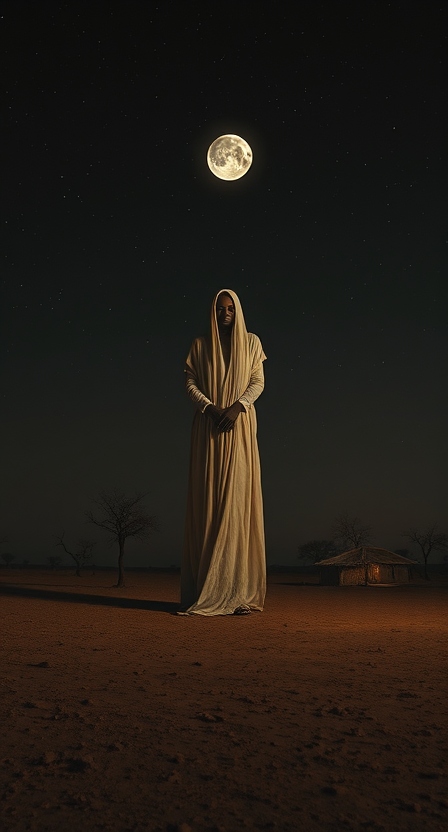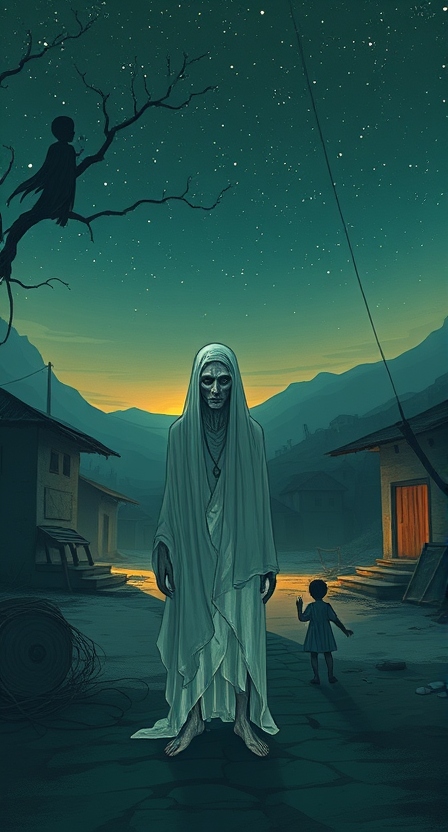The Saharan dunes whispered endless ancient tales. Though sad and heavy, the winter winds carried these tales away. Tamar village, like any other Saharan village, was surrounded by infinite sand and whispered stories. These stories echoed through all the nearby villages and became part of the people’s reality.
Tamar’s nights were heavy and eerie, shaped by fear, uneasy silence, and dry thoughts. However, the mornings brought children’s laughter, singing, and dancing, especially during weddings.
Silence conquered the entire village each night they celebrated weddings that lasted for forty days. Only the voices of the elderly leaked between the straw houses as they told stories of unknown worlds—worlds they knew too little about, yet enough to halt an entire wedding ceremony.
An old lady lay on a rope bed in the middle of the vast houseyard. Her three grandchildren, sitting barefoot on the ground, faced her eagerly. They were ready to hear her endless stories.
“The lamenting bride, though terrifying and heartbreaking, was an ordinary young girl just like you,” the old lady began, casting curiosity mixed with terror over their little souls. Her voice trembled—not from age, but from the weight of the truths she carried.
“That girl was too young to understand the complexities of life, yet she knew what she wanted in life,” she continued.
“And what did she want?” one of her grandchildren asked, her voice filled with innocent curiosity.
“What everyone wants… to love and be loved,” the old lady explained. “Al-Jaha was born in this village. I was the first to carry her in these hands right after she came to life.” She raised her hands into the dark, but unable to resist her fatigue, they fell into her lap as she drifted into sleep.
It was too dark for the children to notice. The weak glow of an oil lamp barely illuminated their grandmother’s face.
“Why do people fear her?” the little girl asked, her eyes wandering fearfully in the shadows.
“Tell us more about her, please!” another grandchild shouted, standing beside the old lady’s head.
“Shush! She might pass by and hear us. I will tell you in the morning,” the old lady said, waking briefly before slipping back into sleep.
Tales say that Al-Jaha was not only remarkably beautiful, but also intelligent, kind, and sensitive. More importantly, she had a happy family. As she grew into a young woman, she became one of the village’s beauty icons. She was so beautiful that her parents appointed her younger brother as her constant escort.
Her captivating beauty turned the village into heaven all year round. Every man in her village and the surrounding villages aspired to win her heart.
Her father was a simple yet progressive man. He valued his daughter’s opinions over fake societal standards.
One night, as Al-Jaha graced the village with her elegant presence, she met a gentleman and fell in love at first sight. The man, Sada, proved his good intentions by proposing the very next day.
Sada was known for his actions. The elderly and the poor spoke of his generosity and kind heart. Day and night, he worked to give what he could to those in need. His charming personality was the talk of the girls in gatherings and by the river.
Get the Full eBook on Amazon Now!
Everyone thought, “Such a perfect match!”
News of Al-Jaha’s upcoming wedding spread quickly. Her peers were overjoyed, knowing she would soon be “off the market,” which raised their chances of finding husbands. However, the men who “lost the competition” secretly nursed their heartbreak.
The wedding was set, just two weeks away.
“But we have rituals… every wedding must be set at least forty days before,” the old lady protested.
“Her father gave his word after her approval. It’s too late to change anything,” her mother explained, her eyes heavy with sorrow.
Al-Jaha’s mother wished for a wedding that honored all the rituals, but neither Al-Jaha nor her father seemed to care. She prayed secretly every night, her heart filled with dread.
Despite the short notice, everything was arranged as perfectly as Al-Jaha’s beauty. The festive atmosphere filled the village, turning the winter nights into breezy spring evenings.
Boys and girls gathered in both families’ houses, singing, dancing, and savoring the joyful moments.
On the morning before the wedding, the village awoke to devastating news. Sada had died in his sleep.
“No cause, just extreme happiness!” his sobbing mother explained to the women who had gathered to offer their condolences.
They buried his body near the river. “His face was clear, like a daydream,” a man commented at the graveyard.
The entire village was devastated. Al-Jaha mourned her lover silently but visibly. Though she shed no tears, her beauty began to fade, like an old desert rose.
“Poor girl! Her face is pale and dim. Such a bad omen!” whispered one woman.
“They should have set the wedding according to the rituals,” another added.
Al-Jaha herself became a “bad omen.” Every day a wedding took place in the village felt like a personal hell. She avoided them all.
The line of men who once wanted to propose to her dwindled as her tragic story spread through the desert.
One day, it was her best friend’s wedding. Al-Jaha couldn’t disregard the social courtesy. She went to the wedding. Everyone looked at her with fake empathy, empathy that was accompanied by incriminating looks.
The women at the wedding denied her fragile presence when they made their comments.
“Poor girl! Her face was once bright as day,” one girl said.
“Yes, such a bad omen!” another girl added, dismissively.
Once those words fell into her sensitive ears, Al-Jaha ran away as fast as her weak feet could take her. She ran to the place where lovers told stories that no one had ever heard—the river.
She opened her arms to the waves that felt warm even though they were too cold. Her escort had resigned due to the tragic event. She had no one… no options… nowhere to go. She embraced the waves that led to her fate. She chanted her song as the other girls chanted in the far village for men to come. She sang:
“Oh, lonely river, here I come,
Take me now to where he lies.
When luck has darkened all my skies,
They showed fake mercy upon my fate.
Take me now before it’s late.
Oh, lonely river, here I come.”
And thus, she drowned. She vanished like a breeze on a quiet night.
The next morning, the village woke up to the mortifying news. “The lamenting bride is gone,” cried a fisherman who spotted her bloating body in her white dress.
They carried her body but couldn’t lift her fragile soul. They buried her under a palm tree next to the river and her fiancé.
The entire village ran to the scene. They were speechless, yet their looks at Al-Jaha’s grave said more than words could ever.
“She died forty days after her fiancé. What a coincidence!” a voice from the crowd commented.
Her mother’s weeping reached the sky. Her escort brother felt purposeless. He would sit at the riverbanks for hours, weeping and praying she would return, promising to resume his duties if she did.
The village was in shock, in denial of how fake kindness can kill, how empathy can victimize the soul.
Her friend’s wedding ceremony continued, the singing, the dancing, the playing children. Food was distributed, and joy was created. The bridegroom was rich, and everyone who attended the wedding had their fair share of mortal joy.
“Whose funeral was it earlier today?” a stranger asked. The man wore clothes strange enough to catch the attention of the playing children at the wedding.
“The lamenting bride,” the boy replied, unable to take his eyes off the man’s torn clothes and shining face.
“And whose wedding is this?” the man asked again.
The children stood silent, unable to answer. They were there for food and fun. They only knew the lamenting bride, whose beauty was once unmistakable.
“Her grieving soul will cast endless sadness and terror on this village. It will return on occasions like this to remind you of her fate,” the man shouted as he made his way outside the village.
His voice, though old and shaky, reached every ear in the village that had been deafened by the loud singing.
Some say he was just a crazy person. Others felt uncomfortable and frightened by his words. The singing and dancing stopped anyway. They believed that the man was from the other world, warning them of a fate similar to the lamenting bride.
Ever since that man’s prophecy, the village spoke about her in hushed voices. Their wedding celebrations were subdued. The lingering question remained unanswered: was it her soul lamenting, or their guilt augmenting?



